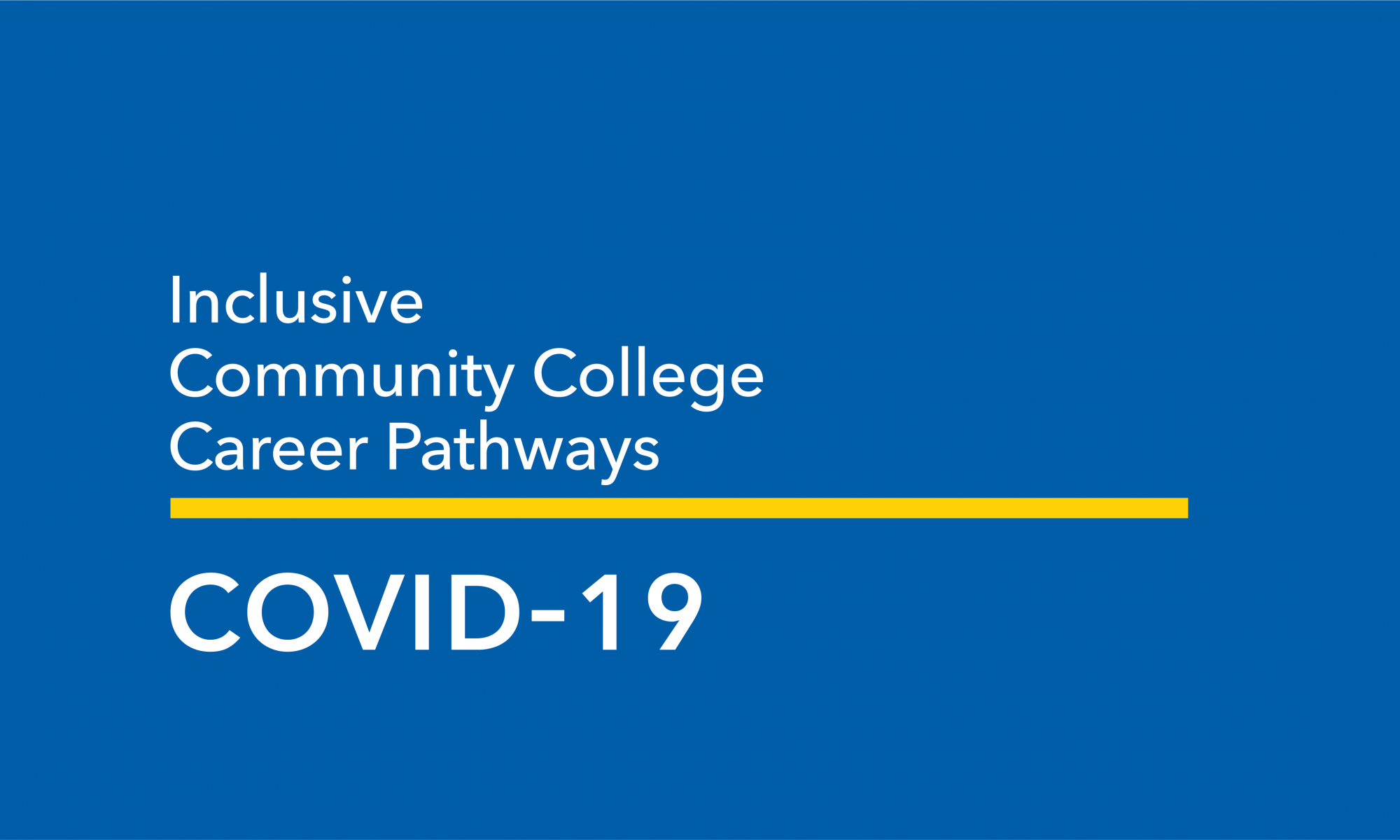This is the fourth of six installments in the series, “Inclusive Community College Career Pathways.” The last blog discussed the use of Universal Design for Learning (UDL) principles to make instructional content more accessible to students with disabilities.
In adapting to the COVID-19 pandemic, educational institutions have had to think critically about how to meet the unique and complex needs of students with disabilities. This means providing existing services, including accommodations and academic supports, and addressing additional challenges caused by the pandemic, such as technology access and mental distress.
The two Community College Pathways to Careers demonstration grants were able to adapt quickly to COVID-19, due to the strong foundations they had built around providing individualized support, delivering accessible content and services, and collaborating with community partners. By leveraging and enhancing these foundations, the projects were able to serve the many needs – academic, career and personal – of students with disabilities during the pandemic. States have developed a range of policies and programs to address these same needs.
Providing individualized support
From the start of the Pathways projects, Onondaga and Pellissippi State provided individualized career, academic and personal supports to students with disabilities. This included one-on-one coaching to help students develop personalized academic and career plans, and hands-on support to guide their progress.
During the pandemic, the projects developed strategies for continuing and expanding such supports. Pellissippi State’s two Career Specialists called students at least weekly to check in, answer questions and provide relevant reminders. In addition, project staff identified stressors that each student might be facing due to the pandemic and worked to address those concerns. Likewise, Onondaga provided technology support to students and sent frequent reminders to keep them on track with their academic and career goals.
Delivering accessible content and services
Both projects previously trained faculty and staff about the principles of Universal Design for Learning (UDL), which gave them a framework for creatively developing content and services that are accessible and delivered in multiple ways for diverse learners.
Amid the pandemic, Onondaga provided additional trainings and resources to help faculty and staff apply these lessons to new remote and hybrid conditions. Onondaga held a virtual two-hour course on UDL and online instructional design for faculty and staff and began to post UDL resources online. Pellissippi State trained staff across career and student support services to deliver career assessments virtually.
However, despite these efforts both projects struggled to provide the same level of services as before the pandemic. Staff from Pellissippi State found virtual workshops and coaching to be less effective than in-person engagement and noted that new students had a particularly hard time adapting. In addition, Onondaga cancelled its five-day UDL Academy for the summer of 2020 due to the pandemic.
Collaborating with community partners
The two projects previously built strong networks within their colleges and communities to address the wide-ranging needs of students with disabilities. This included making referrals to other support services on campus, partnering with local health providers and serving on local committees to address disability issues throughout the community.
The projects relied on these connections to address the needs of students with disabilities during COVID-19. Pellissippi State referred students to counseling services and worked closely with a local health provider to address student mental health concerns. Also, representatives from the college participated in community meetings and task forces to discuss the various challenges facing students with disabilities amidst the pandemic. Onondaga worked with their campus social services hub and community partners to provide additional aid to students to help pay bills and meet other material needs.
State examples and other resources
States have taken a range of approaches to serving the needs of students with disabilities throughout the pandemic. While most states have focused on supporting K-12 students, some have addressed college students specifically.
- Many states, including Arizona, Maine and New Mexico, have developed resources to support educators regarding remote teaching.
- The Wisconsin Student Services Prevention and Wellness Team is holding weekly “Community of Practice” Zoom calls to guide student-service professionals – including school counselors, psychologists, and social workers – on supporting student mental health during school closures.
- North Carolina House Bill 1105 allocated $6.5 million to the Board of Governors of The University of North Carolina to fund scholarships for students with disabilities during the COVID-19 pandemic.
In addition, several organizations have produced resources that can guide state policymaker responses to COVID-19:
- The Association on Higher Education and Disability’s COVID-19 Resources page includes webinars and other resources on supporting students with disabilities amid the pandemic.
- The Transitions to Adulthood Center for Research hosted a webinar on Supporting College Students with Mental Health Conditions in the Wake of COVID-19.
- CAPE-Youth has conducted research on the ways that all 50 states are adapting services to continue serving youth with disabilities throughout the pandemic.
Previous Inclusive Community College Career Pathways blogs:

